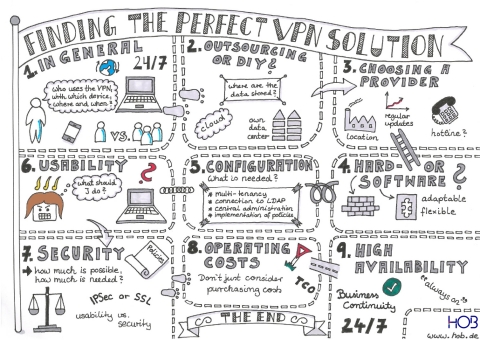CADOLZBURG, Germany--(BUSINESS WIRE)--Selecting the best VPN solution for secure remote access can be compared to the work of a pearl diver. Various products and possibilities quickly lead to a loss of overview. HOB, provider of the secure remote access solution HOB RD VPN, offers in its free e-book some hints and tips how one can find the best VPN solution for the company. The topics included range from general requirements and the depiction of possible features to the question of how to balance security and usability.
1. Define the Need
First of all, the general requirements of a VPN solution for remote access should be defined. These are, e.g., the number of users, the used devices as well as the locations (national/international) from which remote access is required.
2. Outsourcing or “Do-It-Yourself”
Cloud computing is the big trend of the years to come. More and more companies outsource data to a (public) cloud. Depending on the amount of data that need to be managed and how or where data are stored, it can be helpful to outsource the management of the remote access solution to a third party provider.
3. Choosing a Provider
There are important things to consider when choosing a provider, too. One should have a precise look at the provider´s terms and conditions. Additional attention should be paid to security means, provided updates and hotline availability.
4. Software or Hardware?
In terms of VPN solutions, the customer has a huge choice: hardware appliance, software appliance or a “pure” software solution. Generally, a pure software-based VPN is significantly more flexible. It can be installed on standard hardware, adapts seamlessly to existing IT infrastructures and is highly scalable. Another advantage: pure software solutions can be operated virtualized, too.
5. Functional Range and Configuration Options
The company-specific requirements finally define the needed scope of functions and configuration options. Multi-tenant capabilities, the integration of LDAP or central administration and configuration are just some examples of potentially needed features.
6. Usability
When choosing a VPN solution, the issue of usability should not be neglected, either. If users cannot work comfortably with the solution, not only the stress level increases but also the number of support requests rapidly rises. Additionally, a load balancing feature can ensure that all server requests are distributed equally across the available hardware. Thus, performance fluctuations can be minimized.
7. Security
Modern VPN solutions already include many security features. The scope ranges from “must-have” to “nice-to-have” features. Companies need to balance usability and security according to their company policies in such a way as to satisfy all stakeholders.
8. Operating Costs
The costs for a VPN solution are often a decision criterion. In this context it is important to consider not only purchasing costs but also indirect costs, e.g., for training or increased administrative effort. By considering all costs in a comprehensive way (total cost of ownership), slightly higher purchasing costs are often relativized.
9. High Availability
How mission critical is remote access for the company? If company-critical business processes are stopped due to VPN blackout, a priority should be put on high availability. A VPN solution should then offer the possibility to build a cluster that guarantees a high availability rate. If the VPN management is outsourced to a third party provider, a service level agreement (SLA) with a 100% up-time should be signed.
About HOB
HOB GmbH & Co. KG is a mid-sized German software enterprise that develops and markets award-winning innovative remote access solutions worldwide. The core competencies of this successful company, founded in 1964, comprise server-based computing, secure remote access, VoIP and virtualization. For more information, visit the HOB website.




